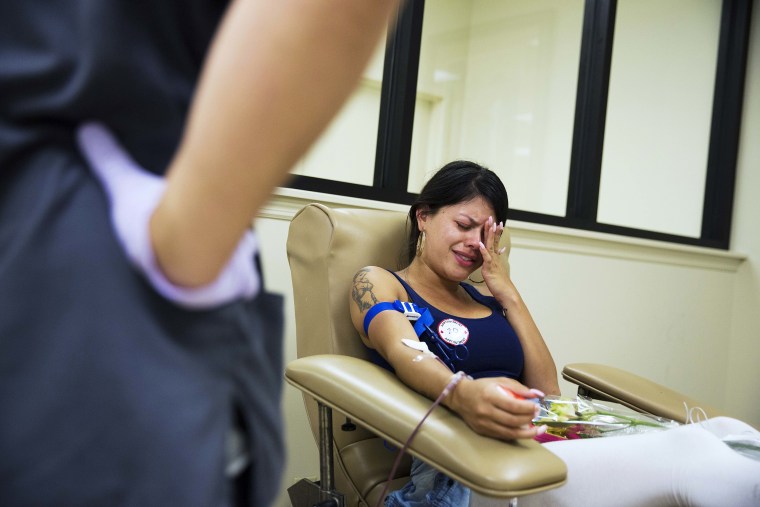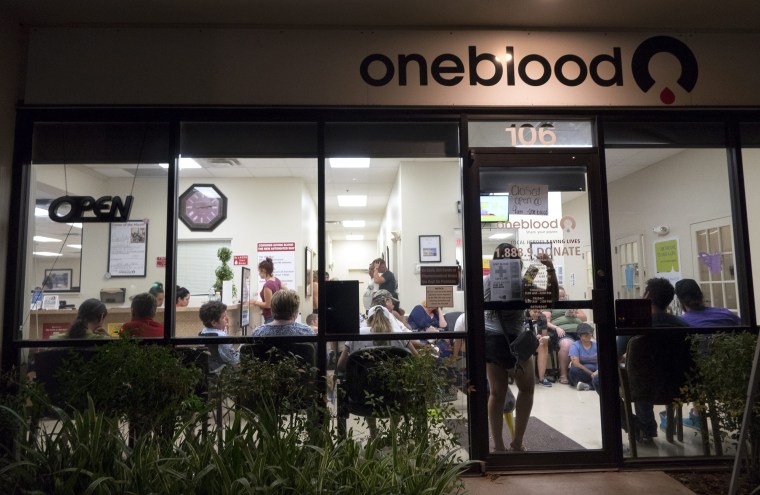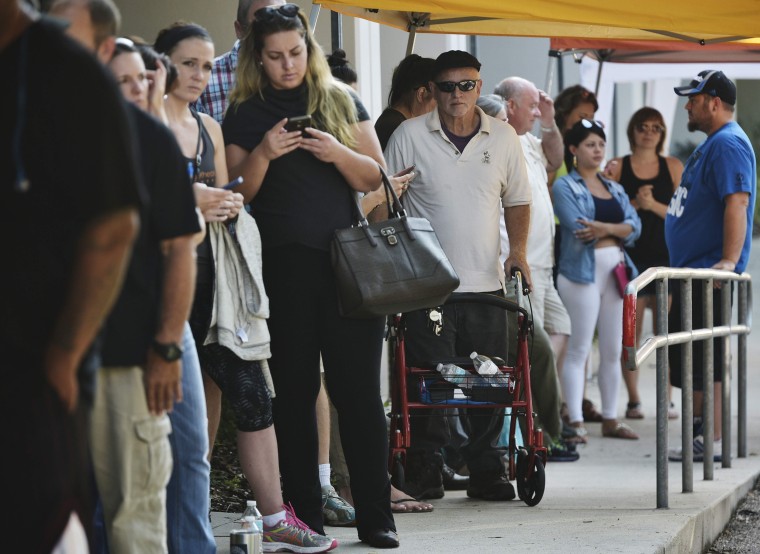Hours after 49 people were killed in a nightclub shooting in Orlando Sunday, people started lining up to give blood.
Lines quickly got so long at one Orlando blood bank, OneBlood, asked people to make appointments, instead. “The blood center is at full capacity and is asking donors to help over the next several days to help replenish the blood supply,” the organization said in a statement.

“Thousands of people packed our donor centers and blood drives eager to donate and help replenish the blood supply. Your immediate response to help patients in need was unprecedented and remarkable,” it added.
“We have experienced a huge outpouring of support. Local blood banks have over 600 units of blood on hand, which is more than usual as a result of all the donations,” said Orlando Health, an area not-for-profit medical network.
But almost as quickly, social media becameoverwhelmed with outrage. The club that was attacked was a favorite among gay men, but there are some restrictions on blood donations by sexually active men who have sex with men.
“Shocking: Gay & bisexual blood donations STILL restricted after #Orlando massacre,” OUT Magazine tweeted.
“There’s an urgent need for blood donors in Orlando. Gay men still can’t donate,” tweeted Jared Polis, a Democratic congressman who’s gay.
It’s a basic tenet of public health and emergency responders when there’s a crisis to give people something to do. Giving blood is almost always No. 1 on the list, because blood shortages are frequent even when there isn’t a crisis, and blood donations help people beyond any immediate crisis.
So many in the LGBT (Lesbian, gay, bisexual, transgender) community felt especially offended that they were excluded from helping their own.
The Food and Drug Administration restrictions don’t quite amount to a ban on gay men. They’re meant to keep the human immune deficiency virus that causes AIDS out of the blood supply. So the FDA asks blood banks to exclude men who have had sex with another man in the past year from donating blood -- a guideline softened last year after years of protest.
Before there was screening for HIV in blood donations, thousands of people caught HIV that way. By the end of 2001, more than 14,000 people became infected with HIV through blood transfusions, many of them children.
Related:As Promised, FDA to Lift Gay Blood Donation Ban
Experts estimate that the risk of being infected with HIV if you get a contaminated blood transfusion is 90 percent. And a single blood donation can go into the arms of three different people, the American Red Cross says.
“HIV antibodies may take a few weeks to develop after infection with the virus."
Tests for HIV don’t catch very early infections.
“HIV antibodies may take a few weeks to develop after infection with the virus. If you were recently infected, you might have a negative test result, yet be able to infect the recipient of your donation,” the American Red Cross says.
There was a high-profile case in 2010. A Missouri man donated blood twice in 2008, and told the blood center he’d never had sex with another man. At his second donation attempt, he tested positive for HIV. Blood he donated the first time went to a kidney transplant patient, who also become infected with HIV.
Investigators determined he’d lied about having sex with other men and that he likely had become infected right before his first donation.

Other people at high risk of HIV or other bloodborne diseases are also excluded from giving blood, including sex workers, injecting drug users, people with recent tattoos and, most recently, people at risk of Zika virus infection. People who lived in Britain since the 1980s are asked not to donate, because of the risk of a human version of mad cow disease, called Creutzfeldt-Jakob disease, that more than 170 people caught from eating British beef.
Gay and bisexual men, especially in the South, have a disproportionate burden of HIV infections. A recent report from the Centers for Disease Control and Prevention found that urban southern gay men have a 30 percent HIV infection rate. African-American men who have sex with men have a 50 percent lifetime risk of HIV.
It’s in part because people fail to get tested, the CDC says, and in part because these communities are not always informed about the risks, and thus not aware of the importance of using condoms and other safe sex practices.
"Today’s tragedy illustrates that it’s the blood already on the shelves that helps during an emergency."
FDA’s policy isn’t universally accepted by experts. Dr. Paul Volberding, director of the AIDS Research Institute at the University of California San Francisco, says a one-year exclusion is far too long because newer tests can show if someone is infected within a few days.
However, OneBlood says its donations get to recipients within three days. It hasn’t even been able to adopt the FDA’s latest guidance, and still asks all men who have ever had sex with another man to hold off on donating.
The CDC and FDA say the restrictions have helped keep the blood supply alomost free of HIV.
The CDC estimated the risk for HIV infection through blood transfusion is now about one in 1.5 million.
Only about 10 percent of Americans eligible to donate blood do so in any given year, but high-profile attacks and disasters often cause people to turn out.
The Red Cross said it expected large crowds at four blood drives to be held in the Washington, D.C. area Monday. Red Cross blood drives were scheduled across the country Monday and Tuesday. And the organization has a website to help people find blood drives.
"Today’s tragedy illustrates that it’s the blood already on the shelves that helps during an emergency," the Red Cross said

